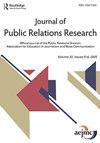Editor’s essay: Making mentors
IF 4.4
2区 文学
Q1 COMMUNICATION
引用次数: 0
Abstract
Sometimes, when one gets to a certain age or stage in life, some people want to know the history behind the present, perhaps to glean insights for their own evolution, or possibly to craft conjectures on the possible evolutions of others. As I reflect on my own journey into a more-authentic self, I think about how hard I’ve worked, how lucky I’ve been to have strong family and employer support, and how grateful I feel to all my mentors. Without question, no one gets to where they are without lots of help from lots of people. By definition, a mentor is someone who has more experience than you, that you trust to give you advice. In my personal and professional lives, I’ve been the recipient of tons and tons of advice, usually from people with more experience (or at least more opinions) than myself in a given area. Typically, the advice is well intentioned, and very often, the input is helpful. Sometimes, I’m also asked for advice or to be a mentor to others, which can be tricky. Because, really, a person can only become someone’s mentor when they are permitted to do so, that is, when a mentor’s advice is sincerely requested, genuinely received and intentionally reflected on. In other words, the power to transform an advice-giver into a mentor lies with the advice-receiver. The mentee makes the transformation happen, perhaps by acting on the advice, or by giving it serious consideration, or even just by absorbing it into their ways of thinking, seeing, or being. Some of my own mentors have never actually given me advice, per se. They just are who they are, and I’ve grown in myself simply from observing them. Sometimes, these “passive mentors,” as I like to think of them, are positional or reputational leaders in the academic discipline, or at my institution, or within my myriad communities of identity, affection, or commitment. Sometimes, they are my peers in life or learning. And sometimes they are travelers on paths I may have already taken, but to which they’ve brought their own insights and wisdom. The bottom line is that my mentors (and yours) are everywhere. Any one of us can be someone’s mentor, either by proactively looking out for them, by responsively and responsibly advising them, or even just by passively modeling for them something they might be needing or seeking in the moment – the latter simply by being our full, whole selves. Thank you to all my mentors, those from my past, those in my present, and those still to be revealed in my future, with special appreciation for those mentors who have graciously permitted me to continue evolving past the point where they felt their advice would be helpful. Because of you – all of y’all – I continue on that lifelong journey of becoming (cf. Hall, 1994).编辑随笔:培养导师
有时,当一个人到了某个年龄或人生阶段时,有些人想了解现在背后的历史,也许是为了为自己的进化收集见解,也许是对他人可能的进化进行猜测。当我反思自己迈向更真实自我的历程时,我会想到我工作有多努力,我有多幸运能得到家人和雇主的大力支持,以及我对所有导师的感激之情。毫无疑问,如果没有很多人的帮助,没有人能走到今天。根据定义,导师是指比你更有经验的人,你相信他会给你建议。在我的个人和职业生活中,我收到了大量的建议,通常来自在特定领域比我更有经验(或至少更有意见)的人。通常,建议是善意的,而且通常情况下,输入是有帮助的。有时,我也会被要求提供建议或成为他人的导师,这可能很棘手。因为,事实上,一个人只有在被允许的情况下才能成为别人的导师,也就是说,当导师的建议被真诚地请求、真诚地接受并有意地反思时。换句话说,将建议者转变为导师的权力在于建议接受者。学员可能会根据建议采取行动,或者认真考虑,甚至只是将其吸收到他们的思维、视觉或存在方式中,从而实现转变。我自己的一些导师实际上从来没有给过我建议。他们就是他们,我只是从观察他们中成长起来的。有时,正如我所认为的,这些“被动导师”是学术学科、我所在机构或我无数身份、情感或承诺社区中的职位或声誉领导者。有时,他们是我生活或学习中的同龄人。有时,他们是我可能已经走过的道路上的旅行者,但他们带来了自己的见解和智慧。最重要的是,我的导师(以及你的导师)无处不在。我们中的任何一个人都可以成为某人的导师,要么主动照顾他们,要么负责任地为他们提供建议,甚至只是被动地为他们塑造他们此刻可能需要或寻求的东西——后者只是做我们完整的自己。感谢我的所有导师,那些来自我过去的导师,那些在我现在的导师,以及那些在我未来仍有待揭示的导师,特别感谢那些慷慨地允许我继续发展到他们认为自己的建议会有所帮助的地步的导师。因为你们——你们所有人——我继续着这一生的成长之旅(参见Hall,1994)。
本文章由计算机程序翻译,如有差异,请以英文原文为准。
求助全文
约1分钟内获得全文
求助全文

 求助内容:
求助内容: 应助结果提醒方式:
应助结果提醒方式:


